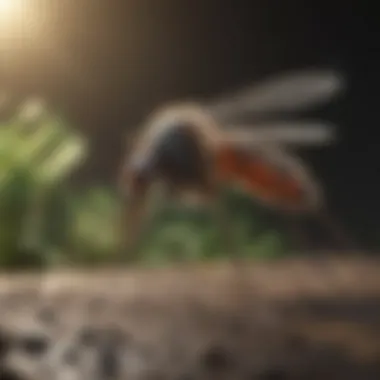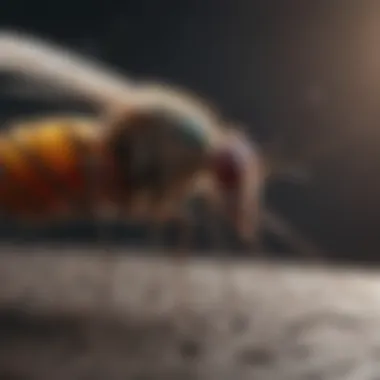Top Strategies to Effectively Repel Mosquitoes


Intro
Mosquitoes are not just an annoyance; they can also pose significant health risks, spreading diseases such as malaria, dengue fever, and West Nile virus. Understanding these pests is the first step in developing effective strategies to repel them. This article provides a comprehensive overview of how to identify common mosquitos, along with proven prevention strategies and treatment options suitable for any home. By the end of this discussion, you will have a toolbox of methods to keep your living space mosquito-free, tailored to fit your lifestyle and preferences.
Pest Identification
Identifying the type of mosquito can greatly assist in developing a proper response. There are several common species that homeowners should be aware of.
Detailed Descriptions of Common Pests
- Aedes Aegypti
This is a black-and-white striped mosquito, commonly found in tropical and subtropical regions. Often, it breeds in standing water close to human habitats. They bite during the day and are known for transmitting diseases like Zika and chikungunya. - Culex Pipiens
Also called the "common house mosquito," this species prefers to breed in stagnant water, such as ponds or ditches. They are most active at night and are known carriers of West Nile virus. - Anopheles
This species is known for being a primary vector for malaria. They have long legs and are easily recognizable during the night.
Signs and Symptoms of Infestations
If you're scratching your head wondering if you might have a mosquito problem, keep an eye out for the following:
- Frequent bites, especially during dusk or dawn.
- Finding mosquitoes resting indoors, often on walls and ceilings.
- Puddles of standing water in places such as flower pots, bird baths, or neglected tires.
"The best defense is a good offense. Recognizing the enemy can pave the way for effective prevention strategies."
Prevention Strategies
Preventing a mosquito invasion requires a proactive approach. Here are some useful strategies that can make a significant difference.
Home Maintenance Tips for Pest Prevention
- Remove Still Water: Mosquitoes breed in stagnant water. Eliminate any puddles from your yard, and regularly change water in bird baths.
- Install Screens: Make sure windows and doors have tight-fitting screens to keep unwanted pests outside.
- Keep Landscaping Trimmed: Overgrown grass and dense shrubs can provide shelter for mosquitoes, so keeping them well-maintained will lessen hiding spots.
Natural Deterrents and Barriers
Certain plants can act as natural repellents:
- Lavender: Not only fantastic for relaxation, its scent can drive mosquitoes away.
- Citronella: Often seen in candles, this plant's oil is known for its mosquito-repelling properties.
- Marigolds: These flowers emit a scent that can deter mosquitoes and other pests.
Treatment Options
When it comes to treating a mosquito problem, homeowners have options ranging from natural to chemical-based solutions.
Overview of Chemical vs Natural Treatments
- Chemical Treatments: Common insecticides include DEET, Picaridin, and IR3535, offering effective short-term solutions. However, it’s wise to follow the instructions closely to avoid environmental impact.
- Natural Treatments: Essential oils such as eucalyptus oil and peppermint oil can be combined with a carrier oil for effective topical repellents.
Step-by-Step Guides for DIY Treatments
Creating your own mosquito repellent can be both satisfying and eco-friendly. Here’s how:
- Essential Oil Repellent Recipe:
- Homemade Citronella Candles:
- Combine 10-15 drops of peppermint or eucalyptus oil with 2 tablespoons of carrier oil like coconut oil.
- Apply it to exposed skin before heading outdoors, replenishing every hour or after swimming.
- Melt wax and mix in citronella oil.
- Pour into mold with a wick, allowing to set before using indoors or outdoors.
A well-rounded understanding of mosquito behavior, prevention, and treatment methods will enable homeowners to reclaim their space and enjoy a mosquito-free environment.
Understanding Mosquito Behavior
Understanding how mosquitoes behave is like having a secret map to outsmart these relentless pests. Gaining insight into their habits can significantly enhance your efforts to repel them. Different species thrive in varied environments, and knowing where they like to lurk can shape the approach to keeping them at bay. This knowledge may reduce not just irritations but also the risk of diseases they carry.
Life Cycle of Mosquitoes
Mosquitoes undergo a remarkable transformation through distinct stages: egg, larva, pupa, and adult. Each phase lasts a varying duration depending on environmental factors like temperature and humidity.
- Egg: Mosquito eggs, often laid in clusters, can be found on still water surfaces or even moist surfaces. They can withstand dry conditions for months, waiting for the next rain.
- Larva: Once the eggs hatch, larvae emerge and hang out near the water's surface, feeding on organic material and filtering food particles from the water. This stage can last a week or two.
- Pupa: The pupal stage is a resting, transitional phase where they metamorphose into adult mosquitoes. This stage is short-lived, generally lasting 1 to 4 days.
- Adult: Upon emerging, adult mosquitoes seek food, typically blood, to nourish their eggs. They can fly significant distances, making it essential to know when and where they are active.
By recognizing these stages, homeowners can target efforts at specific times to prevent mosquitoes from developing.
Attractants for Mosquitoes
Knowing what brings mosquitoes to the yard can be like holding the keys to a jail cell. They're drawn to a variety of attractants. Some main culprits include:
- Carbon Dioxide: Humans and animals exhale CO2, signaling a nearby snack for mosquitoes. The higher the concentrations in an area, the more inviting it appears.
- Body Heat and Sweat: Warm bodies produce heat and lactic acid, compounds notorious for attracting mosquitoes. This is particularly a concern during outdoor activities on warm days.
- Fragrances: Certain floral fragrances, perfumes, and even some shampoos can pique a mosquito's interest. It’s essential to be cautious with scented products when outside.
- Standing Water: Water is the cradle of life for mosquitoes. Even small puddles can serve as breeding grounds. Regular maintenance around the property reduces the availability of suitable habitats.
Overall, understanding and identifying these attractants paves the way for more effective mosquito control strategies. By addressing what draws them in, homeowners can decrease mosquito populations and enjoy their outdoor spaces in peace.
Natural Repellents and Essential Oils
When it comes to keeping mosquitoes at bay, the allure of natural repellents and essential oils has piqued the interest of many homeowners. Not only do these solutions come with a certain appeal of safety and environmental friendliness, but they also provide a scent that is often more palatable than synthetic options. Many of these natural oils possess repellency properties derived from their botanical origins, making them worthy contenders in the never-ending battle against these pesky insects.
In this section, we will dive into three popular natural repellents: Lemon Eucalyptus Oil, Lavender Oil, and Tea Tree Oil. Each has its own unique characteristics and benefits, providing a diverse arsenal for those looking for alternatives to traditional chemical repellents. It's essential to note that while these oils are effective, proper use and application methods can significantly enhance their performance.
Lemon Eucalyptus Oil
Lemon Eucalyptus Oil stands out as a front-runner among natural repellents. Extracted from the leaves of the lemon eucalyptus tree, this oil contains a compound called PMD (p-menthane-3,8-diol), which is recognized for its strong insect-repelling properties. Research has suggested that it can offer protection that rivals DEET, making it a formidable competitor in the repellent category.
For application, homeowners can mix lemon eucalyptus oil with a carrier oil, such as jojoba or coconut oil, to ensure skin compatibility. A typical ratio might be roughly 10% lemon eucalyptus oil to 90% carrier oil, although individual preferences can vary. One must also remember that, unlike commercial products, natural repellents often require more frequent reapplication, especially after sweating or swimming.
Lavender Oil
Lavender Oil isn’t just known for its soothing qualities; it also works effectively to fend off mosquitoes. Its pleasant aroma is often a perk for those who may have adverse reactions to synthetic scents. The rich compounds in lavender oil, including linalool and linalyl acetate, help in creating an environment less inviting for these pests.
To harness its power, you can use lavender oil in several ways:
- Diffusion: Using a diffuser in your living space can spread the scent throughout, creating a barrier against mosquitoes.
- Topical Application: Similar to lemon eucalyptus, a diluted lavender oil can be applied directly to the skin for added protection.


Moreover, lavender oil can work wonders in reducing the irritation caused by mosquito bites, offering a win-win scenario for homeowners.
Tea Tree Oil
Tea Tree Oil, widely celebrated for its antiseptic properties, also carries repellent capabilities that shouldn’t be overlooked. Derived from the leaves of the Melaleuca alternifolia tree, the oil contains a mix of compounds, notably terpenes, that deter various insect species, including mosquitoes.
Much like the other oils, tea tree oil should be diluted before applying it to the skin. A general guideline is to mix a few drops with a carrier oil or even in DIY sprays with witch hazel or distilled water.
Given its multi-faceted benefits—from repelling mosquitoes to treating minor cuts—this oil serves as an excellent staple for households that embrace natural living. It's worth mentioning that results may vary based on individual body chemistry and environmental factors, so a bit of experimentation might be needed to find the best personal blend.
"Natural repellents not only offer a defense against mosquitoes but also promote a healthier home environment, free from harsh chemicals."
In summary, incorporating natural repellents and essential oils into your mosquito-repelling strategy can be a beneficial and effective option. Understandably, these oils may require more diligence in application and frequency, but the advantages they bring to personal comfort and environmental health are worth the effort.
Chemical Repellents: What to Choose
When it comes to keeping mosquitoes at bay, the world of chemical repellents offers a variety of options that can be both effective and safe when used properly. Understanding which chemical repellents to choose can make all the difference in your discomfort level during those balmy summer evenings. With an array of products available, it’s crucial for homeowners to be informed about the specific benefits and considerations tied to these substances. Not every repellant offers the same level of protection or safety, so knowing what’s out there is essential for choosing the right one for your family's needs.
DEET: Efficacy and Safety
DEET, or N,N-Diethyl-meta-toluamide, is perhaps the most well-known mosquito repellent. Used widely since the 1950s, it has a strong reputation for effectiveness. Studies show that when used properly, products containing DEET can provide significant protection against mosquitoes for several hours.
However, some important safety considerations come into play. It’s recommended that you follow product guidelines to avoid skin irritations. Applying it to clothing instead of directly to the skin can also help minimize risks. It's important to remember that although DEET is deemed safe for adults and children over two months old, it should be used with caution and never ingested.
Picaridin: A Reliable Alternative
If DEET feels a bit too harsh for your taste, consider Picaridin. This chemical is gaining attention as a more comfortable alternative. Often described as having a milder scent and feeling less greasy, Picaridin is also effective against mosquitoes.
What sets it apart is its versatility. It can be used on skin and fabrics alike, making it a viable option for those who love the outdoors. Notably, many people find it doesn’t cause the same strong odors associated with DEET, making it a pleasant choice for family outings. However, always check the concentration; higher percentages may offer longer-lasting protection.
IR3535: A Lesser-Known Option
Let’s not overlook IR3535, a chemical that, while less well-known, is an effective alternative. This synthetic amino acid has been used in Europe for several decades and is recognized for its safety profile. It’s often found in formulations aimed at those who prefer a more natural choice without sacrificing efficacy against mosquitoes.
IR3535 stands out for its versatility, too. It works not just against mosquitoes but also protects against other biting insects. Another silver lining? It’s a potential match for folks with skin sensitivities, given its lower irritation risks. Like any product, reading the label is essential to ensure you get the protection you need.
"Understanding the array of chemical repellents available is key to safeguarding your home and loved ones from mosquitoes. Selecting the right product can mean the difference between an enjoyable evening outdoors and a walk down discomfort lane."
In summary, when choosing a chemical repellent, consider factors such as efficacy, safety, and your personal comfort preferences. DEET has long been the gold standard, while Picaridin and IR3535 offer promising alternatives. Choose wisely to maintain a bug-free zone in your backyard, allowing you to enjoy your evenings outdoors.
Environmental Modifications
When it comes to keeping those pesky mosquitoes at bay, environmental modifications can play a crucial role. Understanding the habitat and preferences of mosquitoes allows homeowners to implement thoughtful changes in the surroundings to make them less inviting. Not only does this strategy minimize the risk of mosquito bites, but it also contributes to an overall pleasant living environment.
Eliminating Standing Water
One significant factor that attracts mosquitoes is standing water. These insects need water to reproduce, with females laying their eggs in stagnant pools. As a homeowner, the first step you should take is to eliminate any sources of standing water around your property. This includes:
- Birdbaths: Change the water regularly. If possible, consider using a fountain to keep the water moving.
- Flower pots: Ensure there’s proper drainage to avoid water accumulation. It can indeed be a hassle but keeping an eye on this makes a big difference.
- Gutters: Clean your gutters often to prevent blockages that can trap water.
Taking these simple steps not only removes breeding grounds but also limits mosquito populations significantly. Like they say, "out of sight, out of mind," and that holds true for these pests when the opportunities they need to breed disappear.
Landscaping Choices
The layout and design of your garden can be a double-edged sword. A beautiful garden can also serve as a haven for mosquitoes. To strike the right balance, consider these landscaping strategies:
- Plant Selection: Choose plants that repel mosquitoes. For instance, marigolds and basil are not just visually appealing but can deter these pests.
- Open Spaces: Avoid overcrowding plants; mosquitoes love dark, damp areas. Trim hedges and shrubs to keep spaces light and airy.
- Mulch Carefully: While mulch is great for gardens, ensure it doesn’t hold excess moisture. Using too much can create ideal breeding spots.
Being strategic about your landscaping decisions directly impacts how welcoming your yard is to mosquitoes. An informed homeowner can craft a garden that exhibits beauty and functionality.
Lighting Adjustments
The type of lighting used around your home can either attract or repel mosquitoes. Regular outdoor lights tend to draw these insects, making it essential to choose wisely. Here are some options to consider:
- LED Lights: Mosquitoes are less attracted to LED lights, so switching to these can be beneficial. Plus, they are energy-efficient!
- Yellow Bug Lights: These specialized bulbs are designed to be less attractive to insects. Installing them in outdoor areas can help create a barrier against annoying bites.
Making such lighting adjustments not only enhances your home’s ambiance but also diminishes mosquito allure. After all, why invite trouble with unnecessary light?
"The best offense is a good defense," so adjusting your environment right can make all the difference in pest control.
Implementing these environmental modifications will yield substantial benefits in controlling mosquito populations. By being proactive and thoughtful in maintaining your surroundings, you effectively keep these unwanted guests away.
Repellent Devices and Technologies
When it comes to keeping pesky mosquitoes at bay, investing in advanced repellent devices and technologies can be a game-changer for homeowners. Not only do these devices provide convenience, but they also introduce a layer of defense that complements other mosquito control methods. In an age where technology is rapidly evolving, it’s essential to navigate the landscape of mosquito repellers to find an optimal solution suitable for your home environment.
Ultrasonic Repellers
Ultrasonic repellers rely on high-frequency sound waves, inaudible to human ears, to deter mosquitoes. These devices emit sound waves that are said to disrupt the communication among mosquitoes, making it difficult for them to find their prey.
While research on effectiveness is mixed, many homeowners appreciate the non-intrusive nature of these gadgets. Some models can be plugged into wall sockets, creating a barrier within a specified radius. What’s more, they are often marketed as environmentally friendly since they don’t involve harmful chemicals.
However, a common concern remains: whether these gadgets truly deliver on their promises. The skepticism often stems from contrasting user experiences. Some swear by their ultrasonics, while others see little to no difference. It's wise to approach with an open mind. At the end of the day, they are a tool to include in a broader mosquito control strategy.
Mosquito Traps
Mosquito traps are designed to lure and capture these pests, which can offer a significant reduction in their populations around a property. These traps can utilize various mechanisms—some mimic human scents, while others use light or heat to attract mosquitoes. Once within the trap, mosquitoes are typically caught using suction or adhesive surfaces.
- Benefits of Mosquito Traps:
- Effectively reduce mosquito populations over time.
- Many models do not rely on harmful chemicals.
- Some are designed for both indoors and outdoors, making them versatile.
Nevertheless, it’s important to consider placement. For instance, traps should be set away from areas where people gather to avoid attracting more mosquitoes to those spaces. Regular maintenance is also key; if a trap fills up with dead insects, it may deter potential catches unless emptied promptly.
Insect Zappers


Insect zappers, often resembling lanterns, have made quite the splash in mosquito management. These devices attract mosquitoes through ultraviolet light and subsequently zap them using an electrified grid. They provide a visual assurance of efficacy; hearing the zap can provide peace of mind to homeowners who are invested in mosquito control.
But it's not all sunshine and rainbows. While zappers can significantly reduce mosquito populations, they also tend to attract other beneficial insects, including bees and butterflies. This collateral damage has raised concerns among environmentally-conscious homeowners. To strike a balance, it's suggested that zappers be placed strategically, perhaps a distance away from blooming plants or gardens.
"Using a combination of different devices and methods can lead to a more effective and balanced approach to mosquito control."
Preventive Measures at Home
When it comes to keeping mosquitoes at bay, preventive measures at home play a pivotal role. Not only do they help reduce the likelihood of these pests invading your space, but they also create a more comfortable environment for all who reside within. Employing these strategies allows homeowners to take charge, rather than simply reacting to the problem after it arises. By adopting a proactive stance, you can significantly diminish mosquito populations around your property.
This section delves into two critical components of mosquito prevention: using screens and barriers and managing your outdoor living spaces effectively. Each measure is straightforward but can yield substantial benefits when applied correctly.
Using Screens and Barriers
Installing screens on windows and doors acts like a fortress against mosquitoes. It’s one of those simple solutions that often gets overlooked. Fine mesh screens not only keep out the tiny pests but also allow fresh air to flow through your home. It's like having your cake and eating it too — enjoying a breeze without inviting unwanted guests.
- Benefits:
- Enhanced Comfort: Screens can significantly improve indoor air quality while keeping pesky bugs outside.
- Reduced Dependency on Chemicals: By creating a barrier, the need for chemical repellents indoors is minimized.
A quick trip to your local hardware store can equip you with everything you need:
- Screens for windows and doors.
- Sealants to cover gaps.
- Magnetic screen doors that make for easy passage while still blocking insects.
"A well-placed screen can be your first line of defense against an army of mosquitoes."
Outdoor Living Space Management
Your outdoor spaces should be a haven for relaxation and enjoyment, not an arena for mosquito battles. How you manage these areas has a significant impact on mosquito presence. Here are some tips to cultivate an outdoor environment that discourages these pests:
- Maintain Your Garden: Regularly trim hedges and mow your lawn. Mosquitoes like to hide in tall grass and dense vegetation. Keeping it neat and tidy can eliminate potential resting spots.
- Create a Dry Environment: Since mosquitoes breed in standing water, it's crucial to eliminate any stagnant water around your home. Check places like:
- Use Natural Barriers: Consider incorporating plants known to repel mosquitoes in your landscaping, such as lavender, citronella, and marigolds. Besides being visually appealing, these plants add another layer of protection.
- Designated Outdoor Spaces: If you enjoy gatherings or barbecues, consider setting up an area with portable insect traps or citronella candles. These can serve as a deterrent while you have fun.
- Flower pots
- Bird baths
- Pet water bowls
- Gutters—make sure they're not clogged
By making these small changes in your outdoor areas, you not only enhance your living conditions but also create a less hospitable environment for mosquitoes. Take the bull by the horns — with the right prevention, your home can be a refuge from these annoying invaders.
Seasonal Considerations
Understanding how seasons affect mosquito behavior is crucial for effective prevention measures. Mosquitoes aren’t just pests that buzz around all year; they have specific cycles of activity and dormancy that align with climate shifts. Recognizing these patterns allows homeowners to tailor their mosquito control strategies, making them more efficient and significantly reducing the annoyance caused by these insects.
Identifying Peak Mosquito Season
Mosquito populations can swell dramatically during certain times of the year, primarily aligning with warmer temperatures and increased humidity. In many regions, the peak season starts in late spring and extends through the summer. During this period, the female mosquito is most active, as she needs blood to nourish her eggs.
In temperate zones, you might see activity peak from May to August. However, it’s important to note that warmer climates can see mosquito presence year-round. For instance, southern states like Florida have an almost continuous mosquito presence due to their milder winters.
Homeowners can track local mosquito activity by referring to community guidelines or even engaging with local health departments. Monitoring resources such as local weather forecasts and public health announcements can also yield essential insights into mosquito patterns. They may highlight upcoming surges in activity, helping you adjust your defensive methods accordingly.
Adapting Strategies Throughout the Year
Shifting your strategies based on seasonal changes is not just smart; it’s necessary. During peak seasons, heavier reliance on repellents becomes vital. For instance, with a rise in mosquitoes, applying chemical or natural repellents frequently is critical to maintaining effectiveness.
On the other hand, as temperatures decline in fall, some strategies can be scaled back, allowing for a period of relief from aggressive anti-mosquito measures. Consider the following strategies:
- Early Spring: As temperatures begin to rise, start preparing your environment by eliminating standing water. This prevents breeding grounds from forming, leading to fewer mosquitoes later in the summer.
- Summer Peak: Increase the use of repellents and other methods, such as installing screens on windows and doors. Mosquito traps or insect zappers can also help capture active mosquitoes during bustling summer nights.
- Autumn: As the weather cools, continue to monitor the environment but reduce the frequency of chemical applications. Instead, focus on preventative measures – clearing out any standing water and cleaning gutters of debris.
- Winter: This is a dormant time for many mosquito species. It’s a good opportunity for comprehensive cleaning. Properly store outdoor furniture and equipment to minimize potential breeding sites for when the season changes again.
By understanding the evolution of mosquito activity associated to varying seasons, homeowners can foster a more effective repelling strategy that saves time, money, and frustration. Crafting an adaptable defense plan ensures that you are ready to face these bloodsuckers—no matter the time of year.
Residential versus Commercial Solutions
When it comes to tackling the nuisance of mosquitoes, distinguishing between residential and commercial solutions is vital. Each category has its own specific challenges and strategies. Understanding this difference can help homeowners and business owners alike tailor their approaches effectively.
Tailored Approaches for Homeowners
For homeowners, addressing mosquito issues often begins at the front door. The strategies must be practical, cost-effective, and targeting the unique environments of homes. Homeowners can opt for several tailored methods:
- Preventive Measures: Homeowners often prefer to focus on prevention. Regularly inspecting their property for standing water, which can serve as mosquito breeding grounds, is essential. Flowerpots, birdbaths, and clogged gutters are places where water can accumulate. Eliminating such sites not only reduces the mosquito population but also saves a headache down the line.
- Natural Repellents: Many homeowners lean toward using natural repellents due to their safety for family and pets. Utilizing plants like citronella or marigold can serve as a natural barrier. Additionally, applying essential oils like lemon eucalyptus can provide a pleasant aroma while keeping pests at bay.
- Residential DIY Methods: Some might even choose to engage in a bit of DIY magic. Homemade traps using sugar and yeast can attract mosquitoes and trap them effectively. Little fixes like using fans in outdoor seating areas or placing mosquito netting around patios can also deter these pests beautifully.
Commercial Strategies for Larger Areas
In a commercial setting, the approach steps up a notch. Larger areas, such as parks or outdoor venues, require more robust and systematic strategies:
- Professional Services: Engaging professional pest control services is often a necessity for commercial properties. They can offer specialized solutions, custom-designed to meet the needs of specific environments and to cover more extensive areas effectively.
- Ongoing Monitoring and Control: Unlike a home, commercial spaces benefit from continuous monitoring. This can include deploying traps at strategic points and conducting regular inspections to ensure that mosquito populations are mitigated before they become a nuisance.
- Education and Awareness Programs: This is also an avenue that many commercial operations overlook. By educating staff on practices that can minimize standing water and fostering an appreciation for natural repellents can create a more informed workplace.
"An ounce of prevention is worth a pound of cure" – Benjamin Franklin. This adage couldn’t ring truer for both homeowners and commercial property managers as they strategize against mosquito invasions.
Making informed decisions tailored to either residential or commercial needs not only makes living and working conditions more enjoyable but ultimately protects against the uncomfortable, and at times, dangerous consequences mosquitoes can bring.
Myths and Misconceptions about Mosquito Control
Understanding the myths that swirl around mosquito control is crucial for those looking to protect their homes effectively. Misconceptions can lead to misguided efforts and wasted resources, hindering real progress in keeping these pests at bay. With proper knowledge, homeowners can deploy more effective strategies, optimizing their efforts and resources.
The Truth about Citronella
Citronella has long held the reputation of being a miracle solution for repelling mosquitoes. The scent, derived from the leaves and stems of different species of Cymbopogon, has found its way into candles, oils, and sprays marketed for outdoor use. However, many believe that just lighting a citronella candle will create an invisible barrier against these relentless pests.
The reality? Citronella can have moderate repellent qualities, but it's not a panacea. When used in a confined area like a backyard, the effectiveness is short-lived, disappearing quickly with wind or increased activity. Moreover, citronella often lacks consistency and effectiveness, sometimes requiring frequent reapplication or very specific conditions to work well.
It's essential to manage expectations when it comes to citronella. Those depending solely on it might find themselves swatted in the dark, questioning its reputed power. A more holistic approach, incorporating additional methods alongside citronella, is advisable for anyone serious about reducing mosquito populations in their living spaces.
Debunking Popular Remedies
Over the years, a multitude of home remedies has surfaced, each promising a remedy for the mosquito menace. From vinegar to garlic to various herbal concoctions, the list is endless. Many believe these natural options are safe, effective, and easy solutions. However, reality paints a different picture.


Almost all of these remedies stem from anecdotal evidence. The scientific backing is often weak, leading to inflated claims.
For instance, some swear by the garlic method, claiming that consuming copious amounts alters body odor, rendering one unattractive to mosquitoes. Yet, studies have shown that significant garlic ingestion has no tangible effect on repelling mosquitoes.
Another popular remedy often suggested is vinegar, believed to keep mosquitoes away when applied to skin. However, the scent may attract other insects or simply fail to provide any barrier against mosquito bites.
Here's a short rundown of common misconceptions:
- Vinegar: Anecdotal evidence, little scientific support.
- Garlic: High consumption doesn’t yield desired results.
- Essential Oils: Many are touted as natural repellents, but effectiveness varies widely and often requires higher concentrations, which can be harmful.
Instead of relying solely on these myths, homeowners should take a critical approach, blending scientifically-backed methods with natural solutions where applicable. Misconceptions can often lead to complacency, making room for mosquitoes to thrive. It's wiser to adopt a methodical, multi-pronged strategy that crosses off these fantastical claims.
Best Practices for Application
When it comes to repelling mosquitoes, knowing how and when to apply repellents can make all the difference. The effectiveness of any repellent relies not just on its ingredients but on the method and timing of its application. The goal here is to provide homeowners and housewives with a toolkit for applying repellents effectively while understanding the nuances behind these practices.
Here are key elements worth considering:
- Evaluate Environmental Factors: Local conditions such as humidity, temperature, and vegetation are significant. For example, areas near standing water or thick foliage might require more frequent applications.
- Follow Recommended Guidelines: Each repellent comes with its own set of instructions on optimal use. It's crucial to adhere to these. Not following guidelines might not only reduce effectiveness but could also cause unintended skin reactions or diminish its safety.
- Target Peak Hours: Mosquitoes are typically most active during dusk and dawn. Applying repellent before these times is wise. Planning accordingly lets you enjoy evenings outdoors without unwanted company.
"An ounce of prevention is worth a pound of cure; the same goes for repellent application. Taking proactive steps beforehand can spare you itchy bites later on."
With those considerations in mind, let’s drill down into specific practices that really matter.
When to Apply Repellents
Knowing when to apply repellents can be as vital as the product itself. Applying too late can lead to unwanted bites, while applying too early may force you to reapply more frequently than necessary.
- Before Outdoor Activity: Ideally, repellents should be applied at least 30 minutes to one hour before heading outdoors. This allows the repellent to dry properly and form a protective layer on your skin.
- Remember Physical Activities: If your day includes vigorous activities—like running or hiking—your body may sweat more. This might necessitate an earlier application to maintain effectiveness.
- Watch the Weather: Rain can wash away repellents quickly, so it’s smart to reapply after any showers to maintain protection. Weather conditions can be quite unpredictable, therefore keeping an eye on the forecast before application can save some hassle.
Reapplication Intervals
Understanding when to reapply your chosen repellent is crucial for continuous defense against mosquitoes. Repellents vary in their duration of effectiveness depending on their active ingredients and the conditions often at play.
- Follow Manufacturer’s Recommendations: Most products will indicate how often you should reapply. For example, DEET-based products might last for several hours, while oil-based may need more frequent application. Generally, it would be wise to reapply after two to three hours of being out and about.
- Consider the Activity Level: If you're engaging in activities that lead to sweating or exposure to water, more frequent reapplications are necessary. A simple napkin wipe down can remove a layer of repellent, diminishing its effectiveness.
- Be Mindful of Skin Types: Some skin types might wear off repellents faster than others. Personal experience plays a role in understanding how long a product lasts before needing another layer.
Integrating Multiple Methods
When trying to repel mosquitoes, many individuals gravitate towards one solution, be it a chemical repellent, natural essential oil, or an innovative trap. However, relying solely on one method often leaves gaps in protection. This article section emphasizes the importance of integrating multiple methods for effective mosquito control and will explain why a comprehensive approach not only enhances efficacy but also caters to varying preferences and situations.
Creating a Comprehensive Defense Plan
A successful defense against mosquitoes doesn't boil down to just sprinkling a few drops of essential oil or setting up a trap. Instead, it requires crafting a comprehensive defense plan tailored to individual needs. This plan should encompass various strategies that work synergistically.
- Assess the Environment: Begin by examining your outdoor space. Look for areas where mosquitoes breed, such as standing water in flower pots or clogged gutters. Addressing these issues reduces mosquito populations before they even approach.
- Diverse Repellents: Combine different types of repellents. For instance, use chemical repellents like DEET or Picaridin for personal protection, while simultaneously employing natural repellents—like lemon eucalyptus or lavender oil—in different areas of your home. This dual-action approach ensures comprehensive coverage against mosquitoes.
- Time Management: Mosquito activity fluctuates throughout the day. During dawn and dusk, these pests are most active. Hence, plan outdoor activities accordingly and consider using traps or lighting adjustments during these peak hours.
- Utilize Technology: Consider incorporating modern devices, like ultrasonic repellers or insect zappers, into your strategy. They can complement traditional methods well and could provide a substantial boost in reducing mosquito attraction.
Through this layered approach, homeowners can shield themselves from mosquitoes while creating a more enjoyable outdoor space.
Assessing Effectiveness of Strategies
Once the defense plan is in motion, it's crucial to assess the effectiveness of the strategies employed. Monitoring results over time can help determine the best practices and adjust accordingly. Here are a few ways to gauge this:
- Observation: Keep an eye on mosquito interactions. Are you still seeing them around your home? Consider documenting sightings.
- Check for Bites: If you or your family members experience bites, it might signal that a particular method isn't working as intended. This can prompt a reevaluation of the approach, maintaining flexibility in your strategy.
- Feedback Loop: Engage with community resources or forums such as reddit.com. Often, areas have local authorities or community boards that share insights on what strategies work best in your region.
- Experimentation: Don’t hesitate to tweak your methods. Maybe add an extra layer of natural repellent or a different insect trap to the mix. Testing various combinations will help pinpoint the most effective setup.
By continually assessing and refining your mosquito repulsion methods, you can create a tailored and effective defense against these pests, keeping your residence a comfortable sanctuary.
Local Regulations and Best Practices
Understanding local regulations and best practices plays a crucial role in effectively managing mosquito populations and minimizing human exposure to these pests. With the growing concerns over pesticide use and environmental impact, adhering to community guidelines ensures that mosquito control methods are both effective and aligned with safety standards.
When homeowners consider ways to reduce mosquito populations, they should be aware of their local laws regarding pesticide application, as many regions have specific regulations governing how and when these chemicals can be used. For instance, in some areas, certain pesticides are banned or restricted due to their harmful effects on non-targeted species, including bees and other beneficial insects. Ignoring such regulations not only endangers the local ecosystem but could also lead to legal repercussions.
On the flip side, understanding these guidelines can empower homeowners to utilize effective control measures responsibly. For example, community-led initiatives, such as neighborhood clean-up days focused on reducing standing water, often gain support from local government agencies. When residents band together for a common goal, they create a formidable barrier against mosquito breeding.
Understanding Community Guidelines
Many communities provide easily accessible guidelines regarding mosquito control or pest management through local health departments or environmental agencies. For instance, they might suggest specific practices, such as:
- Proper Waste Management: Encouraging proper disposal of items that may collect water, like tires or buckets.
- Reporting Standing Water: Providing resources for residents to report areas where standing water poses a risk, thus enabling quicker removal by local authorities.
- Organized Spraying Schedules: Informing homeowners about scheduled community spraying events, ensuring that individuals apply strategies in a coordinated manner.
By paying attention to community guidelines, homeowners not only protect their own spaces but contribute to broader public health initiatives.
Sustainable Practices for Long-term Control
Implementing sustainable practices for mosquito control can yield long-term benefits without compromising environmental health. Here are some methods that are often recommended:
- Natural Predators: Encouraging the presence of natural mosquito predators like birds, bats, and certain insects can help maintain a balanced ecosystem.
- Organic Mulching: Utilizing mulch around plants can prevent water accumulation while providing necessary nutrients to the soil.
- Native Plant Landscaping: Planting native flora can attract beneficial insects that help inhibit mosquito populations naturally.
Using these sustainable tactics not just curbs mosquito populations effectively, but also nurtures local biodiversity, ultimately creating a healthier environment for everyone.
"Adhering to community regulations while embracing sustainable methods creates a synergistic effect — a community that thrives together, without compromising environmental integrity."
Resources for Further Information
Understanding how to effectively repel mosquitoes is half the battle. The other half is knowing where to find reliable information and assistance. Resources for further information can empower homeowners to make informed choices about their mosquito control strategies. In today’s world, misinformation can spread like wildfire, leading many down the wrong path in their battle against these pesky insects. Therefore, it’s crucial to seek out reputable sources that offer guidance and assistance tailored to your specific needs.
When gathering resources, it's beneficial to explore a variety of platforms that can provide insights on effective mosquito repellent methods, local regulations, and environmental considerations.
- Credibility Counts: Relying on information from trusted government agencies or professional pest control services can assure you that you are applying strategies that are not just effective but safe as well. This mitigates the risks associated with DIY solutions that may not have scientific backing.
- Community Engagement: Joining local forums or community boards, such as Reddit or Facebook groups, allows you to connect with others who face similar challenges. Pooling knowledge from your neighborhood can lead to discovering unique solutions that less commonly known but highly effective.
- Updated Knowledge: Staying informed about new products, procedures, and regulations ensures that you are not using outdated methods that may no longer be viable. Keeping your finger on the pulse of the latest advancements—especially regarding eco-friendly options—can lead to a greener and more sustainable approach.
"Knowledge is power, especially in the fight against relentless pests like mosquitoes. Utilize all resources at your disposal to secure your space."
By leveraging these resources, you can create a well-rounded, informed approach to mosquito repellent methods, ensuring both safety and efficacy in your efforts.
Government Agencies and Assistance
Government agencies are an indispensable resource for homeowners seeking to repel mosquitoes effectively. Organizations such as the Centers for Disease Control and Prevention (CDC) and the Environmental Protection Agency (EPA) provide invaluable information on best practices for mosquito control. They often issue guidelines on safe pesticide usage, environmental impacts, and steps to take to limit breeding grounds. Local health departments may also offer assistance by conducting mosquito surveillance and providing resources tailored to your specific region’s mosquito-related challenges. Knowing how to navigate these resources can make a significant difference in your pest control results.
Professional Pest Control Services
Engaging professional pest control services can be a wise choice for tackling severe mosquito infestations. These experts come equipped with specialized knowledge and tools that most homeowners simply don’t have. Services vary from assessments of your property to tailored treatment plans that consider local regulations and environmental concerns. Furthermore, they can offer ongoing maintenance to ensure that your home remains a mosquito-free zone throughout the season. With their insights, you might even learn new approaches that can complement your personal efforts and reveal practical adjustments to your outdoor spaces and behaviors.



